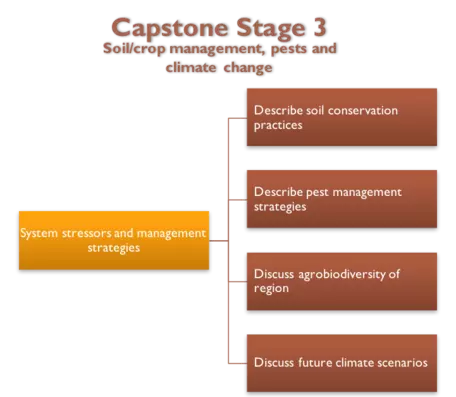Capstone Project Stage 3
Gigi Richard, Colorado Mesa University
Initial Publication Date: January 11, 2018
Summary
Stage 3 of the semester-long Future Food Scenarios capstone project requires students to demonstrate progress toward completion of their regional Future Food Scenarios using additional information that focuses on system stressors and management strategies. Stage 3 is completed following Modules 7, 8, and 9, which consider soil and crop management strategies, pests and pest management strategies, and future projected climate scenarios and possible adaptation strategies. Students at this point in the semester (after completion of Modules 1 to 9) should have described the physical environment of their food region as well as how management strategies are being implemented (or not) to make their food region more resilient. Upon completion of Stage 3, students should have gathered more than half of the information needed to complete their future food scenario for their assigned food region. Stage 3 is the first point where students gather information about the potential future of their assigned region, when they explore future climate projections for their assigned region.
Learning Goals

![[creative commons]](/images/creativecommons_16.png)
Provenance: Gigi Richard, Fort Lewis College
Reuse: This item is offered under a Creative Commons Attribution-NonCommercial-ShareAlike license http://creativecommons.org/licenses/by-nc-sa/3.0/ You may reuse this item for non-commercial purposes as long as you provide attribution and offer any derivative works under a similar license.
As outlined in the capstone overview (Stage 1), Capstone Stage 3 provides a benchmark to assess students progress on their semester-long Future Food Scenarios capstone project. Stage 3 is assessed to determine if students are on track and making progress toward their final project goal.
In stage 3, students move beyond just describing the physical environment and constraints on the food system, and begin to look at the interconnected human system as they consider the types of crop, soil, and pest management strategies being implemented in their food region. In addition, this is the first point where the future is considered as students explore future climate projections for their food region.
Context for Use
See
Capstone Stage 1 for details.
Description and Teaching Materials
Teaching Notes and Tips
What works best
- At this point in the semester, it is probably worth investing some class time to touch base with each student or group about their progress. As with the other capstone stages, the instructor may choose to dedicate one or two class session to the stage. This time becomes more valuable for the students as the final project deadline nears and accumulated semester workload builds.
Assessment
A rubric for assessment of this stage is included with the
Capstone Stage 3 -Student MaterialsReferences and Resources


![[creative commons]](/images/creativecommons_16.png)


